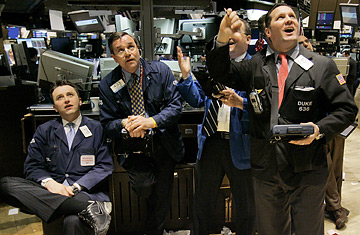
According to new research, the higher a trader's morning testosterone level, the more money he'll likely have made before the close of business.
You can almost hear Gordon Gekko cheer. Financial traders are widely seen as filthy rich, brash, and, well, ballsy. Now it turns out that there's cash in those cojones. According to new research from the University of Cambridge, a male trader's daily testosterone level is higher on days when he makes more than he would in an average day. What's more, the higher a trader's morning testosterone level, the more money he'll likely have netted before the close of business that day. Testosterone, in other words, can be good for business.
In the study, published Monday in the latest issue of the Proceedings of the National Academy of Sciences, a U.S. scientific journal, 17 London traders, aged 18 to 38, donated saliva samples over an eight-day period. Each time they did — once at 11 am, and again at 4 pm, book-ending the bulk of each day's transactions — the traders, dealing mostly in futures, recorded their current profit-and-loss standing. (They were also quizzed to make sure that nothing they'd eaten or talked about outside of their work was acting on their hormone levels.)
Taking the average of just two daily samples makes it tricky to untangle the impact that a higher than average testosterone level has on that day's profit and loss — or vice versa. More telling, though, is the correlation between a higher morning testosterone level and the pumped-up profits recorded later the same day. Traders scored elevated testosterone on different days, scratching out any chance that blanket market changes were at work on the entire group's profits (and hormones). The traders' levels of cortisol, meanwhile, a hormone affecting their response to challenge or stress that was measured using the same samples, was shown to move in tandem with the level of volatility in the markets.
Testosterone levels are known to rise during competitive encounters as much as they do during sexual ones, so it's hardly surprising that the hormone responds to the trials of financial markets. More remarkable, perhaps, is that no one had previously worked out how, especially considering the known risks — sensation-seeking and impulsivity among them — associated with persistently high levels of the hormone. The increased levels measured in Cambridge's brief study might have been acute, as opposed to chronic. And the research was carried out during a relatively calm period in the markets. But consider what scientists call the "winner effect": two athletes preparing to compete against one another will both experience rising testosterone levels. After the race, though, only those of the eventual winner would continue to climb; the loser's falls. The winner thus gets a persistent boost in confidence and appetite for risk, which increases the same competitor's chance of winning again.
But only up to a point. The effects triggered by chronically elevated levels of testosterone can eventually have the opposite effect. Animals observed in this same situation by scientists start to pick fights they ought to avoid, or to patrol a wider, more hazardous patch of territory. Perception of risk becomes blurred. For a trader on a roll in the midst of a bubble, for instance, that suggests "several rounds of winning means testosterone so high they start taking stupid risks," says John Coates, a former Wall Street trader turned senior research fellow at Cambridge, and lead author of the study. Amid today's volatile markets, chronically high levels of cortisol, which can conjure up feelings of anxiety and negative thoughts, are believed likely to squeeze a trader's stomach for risk, potentially perpetuating a market's fall still further.
For the banks, there's little they can do to hedge against the rise and fall of hormones. (Asking after a recruit's age can be a delicate task, let alone his testosterone level.) A handful of major investment banks contacted by TIME all declined to comment on the study. As for the traders, the research is by no means an encouragement to abuse steroids. They're "the most dangerous chemical you can put in your body," says Coates. Doing so would mean "changing your body, your brain, the memories you recall, growth, your mood," he adds. "And they're weird." Gordon Gekko might simply say they're for wimps.
